Western Digital's New VelociRaptor VR200M: 10K RPM at 450GB and 600GB
by Anand Lal Shimpi on April 6, 2010 8:00 AM EST- Posted in
- Storage
Overall System Performance using PCMark Vantage
Next up is PCMark Vantage, another system-wide performance suite. For those of you who aren’t familiar with PCMark Vantage, it ends up being the most real-world-like hard drive test I can come up with. It runs things like application launches, file searches, web browsing, contacts searching, video playback, photo editing and other completely mundane but real-world tasks. I’ve described the benchmark in great detail before but if you’d like to read up on what it does in particular, take a look at Futuremark’s whitepaper on the benchmark; it’s not perfect, but it’s good enough to be a member of a comprehensive storage benchmark suite. Any performance impacts here would most likely be reflected in the real world.
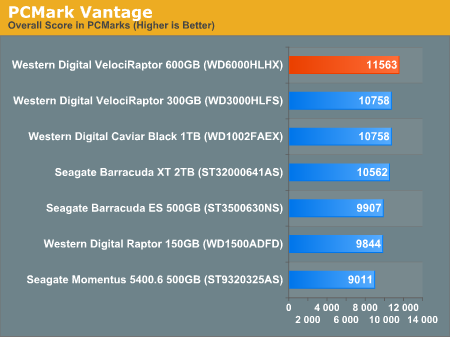
Impacting overall system performance with just a hard drive change is difficult if you're comparing fairly quick drives. You'll note that despite the competitive sequential speeds of the newer 7200RPM TB drives, the 300GB VelociRaptor is still on top. It just goes to show you the value of random access performance. It's not everything, but it's something worth paying attention to.
Compared to the old VelociRaptor, the new 600GB drive posts a 7% higher overall score in PCMark Vantage. The gains in the individual tests range from 3 to 20%.
The memories suite includes a test involving importing pictures into Windows Photo Gallery and editing them, a fairly benign task that easily falls into the category of being very influenced by disk performance.
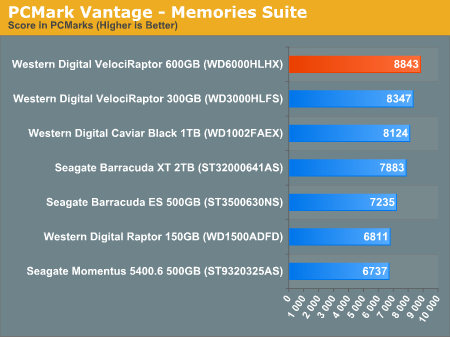
The TV and Movies tests focus on on video transcoding which is mostly CPU bound, but one of the tests involves Windows Media Center which tends to be disk bound.
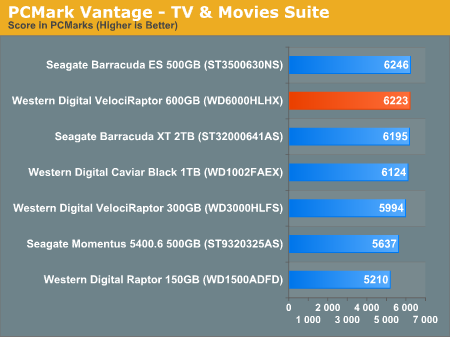
The gaming tests are effectively read tests since they spend a good portion of their time focusing on reading textures and loading level data. Actual game loading performance will differ depending on the game. Take these results as a best case scenario of what can happen, not the norm.
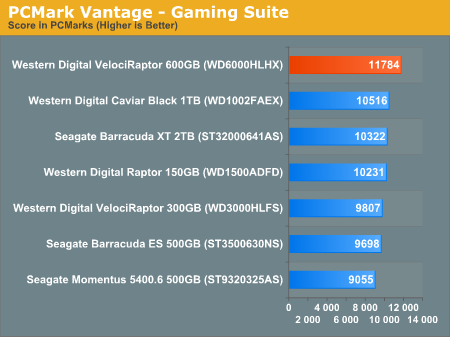
In the Music suite the main test is a multitasking scenario: the test simulates surfing the web in IE7, transcoding an audio file and adding music to Windows Media Player (the most disk intensive portion of the test).
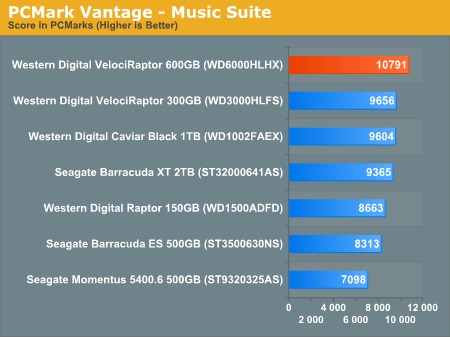
The Communications suite is made up of two tests, both involving light multitasking. The first test simulates data encryption/decryption while running message rules in Windows Mail. The second test simulates web surfing (including opening/closing tabs) in IE7, data decryption and running Windows Defender.
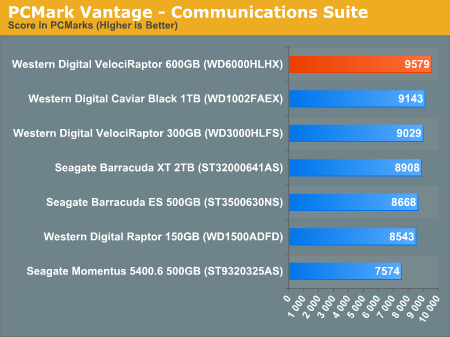
I love PCMark's Productivity test; in this test there are four tasks going on at once, searching through Windows contacts, searching through Windows Mail, browsing multiple webpages in IE7 and loading applications. This is as real world of a scenario as you get and it happens to be representative of one of the most frustrating HDD usage models - trying to do multiple things at once. There's nothing more annoying than trying to launch a simple application while you're doing other things in the background and have the load take forever.
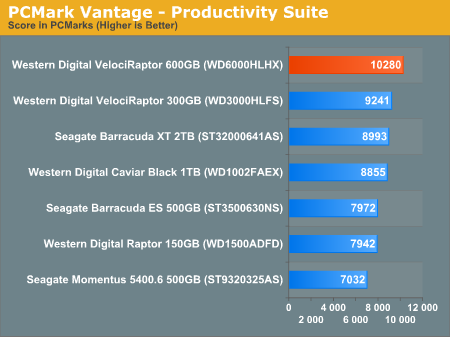
The final PCMark Vantage suite is HDD specific and this is where you'll see the biggest differences between the drives:
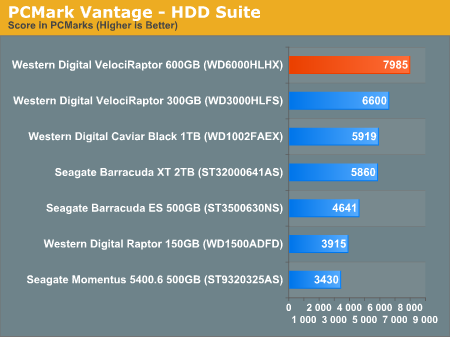










77 Comments
View All Comments
pjconoso - Thursday, April 8, 2010 - link
Maxtor's with Seagate, so there.ClagMaster - Tuesday, April 6, 2010 - link
These are good drives carrying on the Raptor tradition, but at the asking price at ~$0.60/Gb, way too pricy.I am going to wait next year for third generation SSD's at $0.50/Gb and 2-4x the current bandwidth before switching over.
leonsk - Tuesday, April 6, 2010 - link
Agree with Anand that SSD bor boot drive and 2 large HDs in RAID-1 is the most effective rig. What controller do you use? Or are you with software RAID?AstroGuardian - Wednesday, April 7, 2010 - link
Of course not mate. Software RAID is dead. I am sure he is using ICH10R's RAID controller.... Right Anand?bobbyto34 - Wednesday, April 7, 2010 - link
Hello,I have to change my primary hard drive (Samsung Spinpoint F1) because of some read failures...
I'm hesitating between a good ol' 1TB 7200 drive, an x-25M 160Gb or a new Velociraptor.
The computer will be used as music station with Sonar and sound banks. The current problem is that it's quite slow when loading those enormous sound banks with a 7200 drive.
I would like good performance in loading these sound banks, with silence because it's dedicated to music (and some gaming :p), and with reasonable disk space... For the moment, I can't see a good compromise with those 3 parameters. Am I wrong ?
slickr - Wednesday, April 7, 2010 - link
What the heck were you talking there buddy?You just buy 2 1TB HD and an SDD drive, to be faster. Do you know how much such configuration would put you back?
If not, go for the new raptor. Oh really, you just found out hot water. How about you mention its twice as cheap and even more to go for it, ten times more reliable than SSD's, and you can actually store 600gb, instead of 80gb of the intel ssd's or whatever for 250 dollars.
Compddd - Wednesday, April 7, 2010 - link
When will these start shipping?GullLars - Wednesday, April 7, 2010 - link
Another great test from Anand.I have a comment though, and i see i'm a day late, so i may be ignored here :(
The IOmeter sequential tests, while spanning the entire drive, only run for 3 minutes, and therefore only uses a small % of the drive area, so the speeds you see are near max.
For the 600GB velociraptor, you have 140MB/s for 3 minutes = 25GB. By looking at the HDtach curve, the drop-off has barely started by that point.
I also have something i want to get out there. Off-topic to this test, but relevant for high-performance HDDs.
Why hasn't any HDD maker yet added a flash read-cache?
By adding a single 4-8GB MLC NAND chip, costing roughly $2-3/GB = $8-24 added cost, and using it for read-caching hot-files, you can get around 4-5000 4KB random read IOPS = 16-20MB/s (@QD 1) and roughly 40-60MB/s sequential read for the cached data.
Tracking hot-files should be easy to implement simply by logging read-access to LBAs, and with a slight bit more effort, filtering LBAs being read in a small block random pattern. Possibly also caching file-table and folder/file structure and metadata, as well as the data typically read the first seconds after power-up or spin-up.
Using this type of caching would have a noticable effect on typical usage patterns, and especially multi-tasking, but would likely not make an impact on benchmarking since it would take time for new data to reach cache.
Larger hot-files could benefit from the cache as they could be read from both flash and disk at the same time with the speed of both combined (80-140 + 40-60).
Any thoughts about using flash read-cache people?
ETR - Wednesday, April 7, 2010 - link
Thats all i want to know,Does this drive have it or not???
not one reviewer anywhere has that info... nor did WD's website.
gezzzz how can anandtech skip that info................?
BoFox - Thursday, April 8, 2010 - link
Dear Anand,I'm looking to upgrade to 15000rpm SAS drives since my Foxconn Bloodrage motherboard has 2 SAS ports (it's an X58 motherboard and there are couple other from Asus and Gigabyte that include SAS ports, IIRC..).
How would this 600GB Velociraptor fare against a Seagate 15k.7 600GB Cheetah in terms of speed/performance?
Sure, a 15k drive might be a bit more noisy and power-hungry, but I'm ok with this since I have other noisy stuff (including a noisy blu-ray player). I'm thinking that having a couple 15000rpm 600GB SAS drives is still a better investment than those tiny SSD's. Over at techreport.com, it's shown that SSD's (including Intel's) have some serious performance issues with certain real-world applications and that they "degenerate" in performance whether TRIM is being used or not. Stability is another question, right?